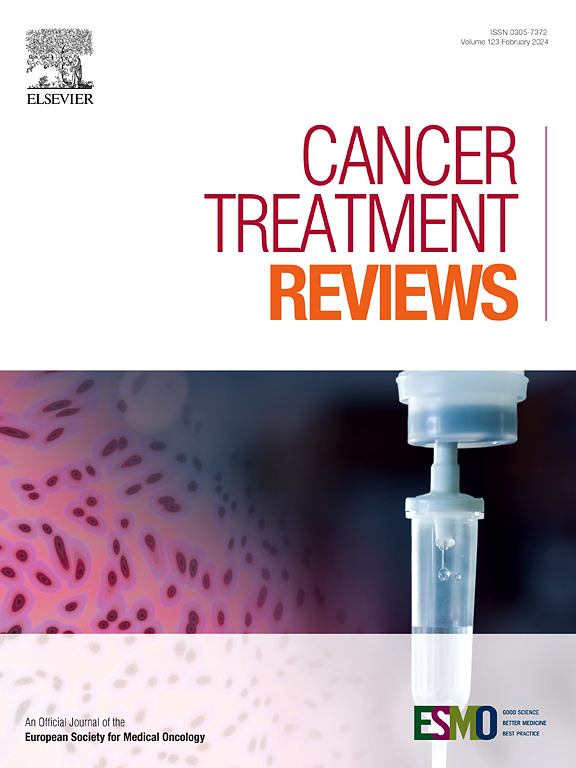Efficacy and safety of antibody-drug conjugates in pretreated HER2-low metastatic breast cancer: A systematic review and network meta-analysis
IF 9.6
1区 医学
Q1 ONCOLOGY
引用次数: 0
Abstract
Introduction
Antibody-drug conjugates (ADCs) trastuzumab-deruxtecan (T-DXd) and sacituzumab-govitecan (SG) provided significant progression-free survival (PFS) and overall survival (OS) improvements over chemotherapy (CT) in pretreated hormone receptor-positive (HR+) and triple-negative (TN)/HER2-low metastatic breast cancer (MBC). However, no direct comparison between the two exists, nor with the more recent datopotamab-deruxtecan (Dato-DXd).
Methods
We conducted a network meta-analysis (NMA) to compare efficacy and safety of T-DXd and SG in CT-pretreated HR+ and TN/HER2-low MBC and assess their benefit over standard CT, exploring also a comparison with Dato-DXd. Hazard ratios (HRs) with 95 % confidence intervals (CI) were calculated for PFS/OS. P-score was used for treatment ranking.
Results
Three RCTs (956 patients) were included in the primary analysis and 5 (1,445) in the exploratory NMA with Dato-DXd. In HR+/HER2-low, T-DXd showed no significant difference in PFS and OS when compared to SG. Similarly, in TN/HER2-low, PFS and OS did not differ significantly between the two ADCs. The P-score analysis favored T-DXd over SG in HR+/HER2-low in PFS (0.90 vs. 0.60) and OS (0.89 vs. 0.60). SG was favored over T-DXd in OS in TN/HER2-low (0.80 vs. 0.69). Similar results were obtained for HR+ MBC when including Dato-Dxd, which showed the worst performance, while T-DXd was the only ADC significantly outperforming CT in OS. The ADCs showed significantly better PFS and OS than CT in HR+/HER2-low and TN/HER2-low (all p < 0.001). SG had higher rates of neutropenia, diarrhea and alopecia vs. T-DXd, which showed more thrombocytopenia, fatigue and nausea. Pneumonitis and cardiotoxicity were typically T-DXd-related, and T-DXd showed more toxicity-related discontinuations.
Conclusions
Similar efficacy with T-DXd and SG in HER2-low MBC was observed, regardless of HR status. Safety profile, local drug-approval criteria and guidelines, patients’ preferences and overall quality of evidence should ultimately guide therapeutic decision-making. Dato-DXd role remains uncertain.
抗体-药物偶联物在预处理her2低转移性乳腺癌中的疗效和安全性:系统综述和网络荟萃分析
抗体-药物偶联物(adc)曲妥珠单抗-德鲁西替康(T-DXd)和sacituzumab-govitecan (SG)在预处理激素受体阳性(HR+)和三阴性(TN)/ her2低转移性乳腺癌(MBC)中,比化疗(CT)提供了显著的无进展生存期(PFS)和总生存期(OS)改善。然而,两者之间没有直接的比较,也没有与最近的datopotamab-deruxtecan (Dato-DXd)进行比较。方法:通过网络荟萃分析(NMA)比较T-DXd和SG在CT预处理的HR+和TN/ her2低MBC中的疗效和安全性,并评估其相对于标准CT的益处,同时探讨与Dato-DXd的比较。计算PFS/OS的风险比(hr)和95%置信区间(CI)。采用P-score进行治疗排序。结果:3个随机对照试验(956例)被纳入初级分析,5个随机对照试验(1445例)被纳入探索性NMA与Dato-DXd。在HR+/HER2-low组,T-DXd组与SG组相比PFS和OS无显著差异。同样,在TN/ her2低的情况下,两种adc的PFS和OS无显著差异。p评分分析表明,在HR+/ her2低的PFS (0.90 vs 0.60)和OS (0.89 vs 0.60)中,T-DXd优于SG。在TN/ her2低的OS中,SG优于T-DXd (0.80 vs 0.69)。HR+ MBC在加入Dato-Dxd后也得到了类似的结果,Dato-Dxd表现最差,而T-DXd是OS中唯一表现明显优于CT的ADC。在HR+/ her2低和TN/ her2低的情况下,adc的PFS和OS明显优于CT(均为p)。结论:无论HR状态如何,在her2低的MBC中,T-DXd和SG的疗效相似。安全性概况、当地药物批准标准和指南、患者偏好和总体证据质量应最终指导治疗决策。Dato-DXd的作用仍然不确定。
本文章由计算机程序翻译,如有差异,请以英文原文为准。
求助全文
约1分钟内获得全文
求助全文
来源期刊

Cancer treatment reviews
医学-肿瘤学
CiteScore
21.40
自引率
0.80%
发文量
109
审稿时长
13 days
期刊介绍:
Cancer Treatment Reviews
Journal Overview:
International journal focused on developments in cancer treatment research
Publishes state-of-the-art, authoritative reviews to keep clinicians and researchers informed
Regular Sections in Each Issue:
Comments on Controversy
Tumor Reviews
Anti-tumor Treatments
New Drugs
Complications of Treatment
General and Supportive Care
Laboratory/Clinic Interface
Submission and Editorial System:
Online submission and editorial system for Cancer Treatment Reviews
 求助内容:
求助内容: 应助结果提醒方式:
应助结果提醒方式:


